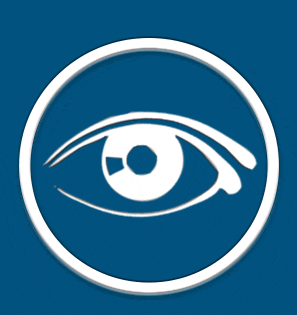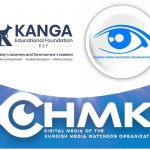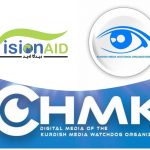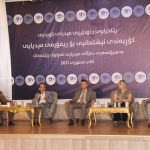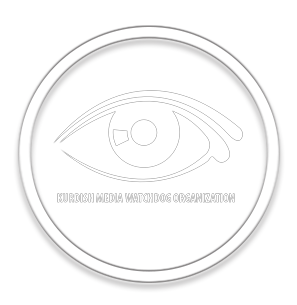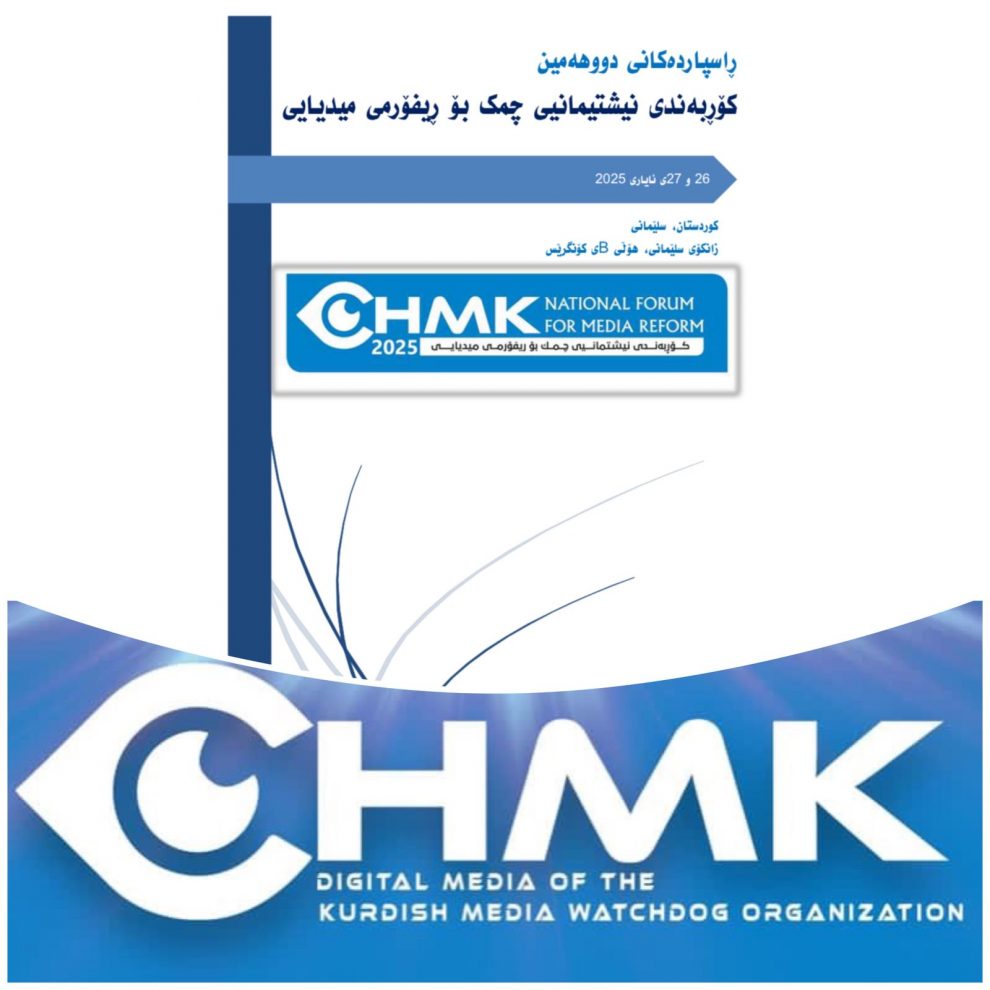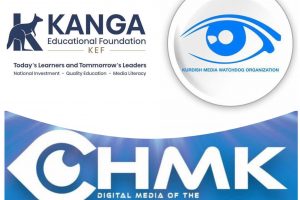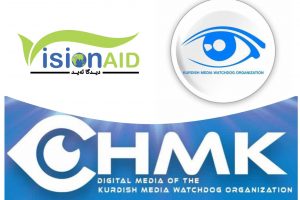On Monday and Tuesday (26–27 May 2025), the second CHMK National Forum on Media Reform was jointly organised by the Kurdish Media Watchdog Organisation (CHMK) in partnership with the University of Sulaimani (UoS). Over the course of two days, the forum facilitated in-depth discussions and the exchange of perspectives among experts and representatives from the legislative, executive, and judicial branches, as well as from media institutions and civil society organisations across the Kurdistan Region of Iraq. The forum concluded with a set of concrete recommendations directed at relevant stakeholders, including the following:

Recommendations to the Legislative Authority
- Revision and Harmonization of Media Law: Revise and consolidate existing legislation governing media and journalism in the Kurdistan Region to align with the evolving landscape of print, broadcast, digital platforms, social media, and emerging technologies such as artificial intelligence. This includes reviewing Laws No. 10 of 1993 (Press Law), No. 35 of 2007 (Journalism Law), No. 06 of 2008 (Law on Misuse of Communication Devices), No. 11 of 2013 (Right to Information Law), and No. 01 of 2019 (Law on the Regulation of Commercial Advertising).
- Introduction of a Comprehensive Media Regulation Law: Draft and adopt a new, inclusive legislative framework titled either The Law on the Regulation of Media Content in the Kurdistan Region or a thoroughly revised version of Law No. 35 of 2007. This law should address all contemporary forms of media and ensure the protection of freedom of expression, press freedom, and access to information.
- Establishment of the National Media Council: Pass new legislation to create the National Media Council in the Kurdistan Region, composed of representatives from the legislative, executive, and judicial branches, as well as media professionals and civil society organizations. This council would be tasked with overseeing the media sector and addressing professional issues faced by journalists.
- Creation of the Kurdistan National Fund for Independent Media: Legislate the formation of a Kurdistan National Fund to provide financial support to independent media outlets. The fund would be financed through the public budget and voluntary contributions from the private sector, with safeguards to ensure that editorial independence is preserved.
- Cybercrime, Data Protection, and Privacy Legislation: Enact a dedicated law that addresses cybercrime, protects personal data, and upholds the right to individual privacy within the Kurdistan Region.
- Transparency in Media Ownership and Financial Resources: Develop a legal framework to mandate full transparency regarding media ownership structures, sources of revenue, and financial operations of media outlets in the Kurdistan Region.
Recommendations to the Executive Branch
- Support for the CHMK National Media Reform Forum: Direct the Ministry of Higher Education and Scientific Research in the Kurdistan Region to provide institutional support for future sessions of the CHMK National Forum on Media Reform, to be held annually in conjunction with World Freedom of Expression Day (May 3).
- Development of a Comprehensive Media Framework: Assign the Ministry of Culture and Youth the responsibility of formulating a coherent media system for the Kurdistan Region, outlining its types, principles, and mechanisms of implementation, and integrating updated regulatory guidelines for journalism and media in line with contemporary developments.
- Professionalization and Standardization of Media Practice: Mandate the Ministry of Finance and Economy to establish clear professional standards for media practitioners, defining journalists’ roles, rights, and financial as well as administrative entitlements based on their professional service and qualifications.
- Establishment of a Media Training and Research Centre: Task the Ministry of Higher Education and Scientific Research with setting up a specialized center for media training and research under the umbrella of academic and scientific development initiatives.
- Promotion of Scholarly Media Research: Encourage the Ministry of Higher Education and Scientific Research to publish peer-reviewed academic journals through universities that focus on media studies and critically engage with issues affecting freedom of expression and press freedom.
- Creation of Media Laboratories in Higher Education Institutions: Require the Ministry of Higher Education and Scientific Research to equip media departments within colleges and institutes across the Kurdistan Region with state-of-the-art laboratories, aiming to bridge theoretical learning with the practical demands of the media job market.
- Expansion of Media Education Programs: Instruct the Ministry of Higher Education and Scientific Research to establish departments of media education within faculties of education and basic education to prepare qualified educators in media literacy for all educational levels—kindergarten, primary, and secondary.
- Development of a National Media Education Programme: Collaboratively direct the Ministries of Education and Higher Education and Scientific Research to design and implement a comprehensive national media education and professional development program. This initiative should be integrated into the curricula of kindergartens, schools, and universities, serving as a foundational framework for journalist training—particularly in media and digital literacy.
Recommendations to the Judicial Branch
- Expansion of Specialized Courts: Extend the model of privatized investigative and adjudicative courts currently operational in Sulaimani to other provinces—namely Halabja, Erbil, and Duhok—with the goal of establishing specialized courts that handle cases concerning freedom of expression and press rights across the Kurdistan Region.
- Appointment and Training of Competent Judges and Staff: Assign judges with demonstrated knowledge and sensitivity to issues of freedom of expression and press rights to oversee journalism-related cases. These judges should undergo regular legal and professional development through targeted awareness and training programs. Simultaneously, the personnel of these specialized courts should receive instruction on appropriate procedures for handling both plaintiffs and defendants in such cases.
- Revision of Judicial Expert Appointment Criteria: Revise the selection criteria for judicial experts to give greater consideration to individuals with academic and professional expertise in media—such as university professors, media scholars, and experienced journalists—given their nuanced understanding of both the explicit and subtle dimensions of freedom of expression and journalism within the Kurdistan Region.
- Implementation Mechanism for Media Laws: Develop and institutionalize a robust mechanism to ensure the consistent and informed application of media-related legislation by courts, judges, and security forces. This should include specialized training on handling media and journalist-related legal matters.
- Legal Protection Framework for Journalists: Establish a clear and effective legal mechanism to protect journalists from threats, harassment, or acts of violence, ensuring accountability for perpetrators and reinforcing the safety of media professionals.
Fourth, Regarding Media Power:
- Formulate a national strategy to establish a robust technological infrastructure that supports digital media and ensures equitable access to new technologies across all media platforms.
- Create a national framework to facilitate the self-organization of media outlets and journalists, enabling them to define and uphold professional standards and ethical principles, while ensuring that this framework does not infringe upon freedom of expression and press rights within the Kurdistan Region.
- Implement a national strategy aimed at employing at least 80% of graduates from media-related scientific fields—including media studies, media technologies, advertising, graphic design, and public relations—at universities in Kurdistan.
- Develop a national policy to design clear guidelines for the reporting and broadcasting of sensitive issues such as crime, judiciary matters, and incidents involving violence (e.g., murder, suicide, assault).
- Reactivate the Kurdistan Union of Journalists by nationalizing it, organizing a new congress, and electing a new leadership team with the goal of revising membership criteria based on expertise, skills, and professional competence.
Fifth, Regarding the Organizational Power of Civil Society:
- Establish a national strategy to enhance coordination among media, civil society, and governmental bodies, fostering closer cooperation and shared responsibility, while safeguarding media independence from external influences.
- Develop a national initiative to provide ongoing media literacy training aimed at educating emerging journalists and updating the skills of current professionals.
- Design and implement national plans, projects, and programs to systematically monitor and assess the media’s societal impact, accompanied by the publication of an annual report on the status of media in the Kurdistan Region.
Associate Professor Dr Shwan Adam Aivas
General Coordinator of the CHMK National Forum on Media Reform
Kurdistan Region of Iraq, Sulaimani
Sulaimani University Congress Hall,
27 May 2025
